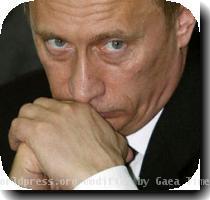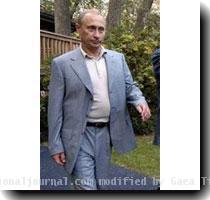Swine flu infects Ukraine’s presidential elections as candidates accused of scaremongering
By Simon Shuster, APMonday, November 16, 2009
Swine flu infects Ukraine’s presidential elections
KIEV, Ukraine — In Ukraine, swine flu is causing electoral fever.
In a hard-fought presidential campaign, critics of Prime Minister Yulia Tymoshenko accuse her of stirring up panic to grab the spotlight from rivals by closing all schools and banning mass gatherings to combat what experts say is a relatively moderate outbreak of the disease.
The arrival of the virus has set off a cycle of one-upmanship and recrimination among leading politicians that has spread fear, sidelined minor presidential candidates, and, health officials say, caused wasteful hoarding by scared citizens of precious medical supplies.
“This is very dangerous,” said Igor Shkrobanets, chief of the local health ministry in the western region of Chernivtsi, one of the nine regions where a partial quarantine has been imposed.
“One or another politician will gain from this situation, but the doctors and their patients certainly will not,” he told The Associated Press in an interview at Ukraine’s federal Health Ministry Monday.
The charismatic Tymoshenko announced the arrival of a swine flu epidemic on Oct. 30, when there was only a single confirmed case in Ukraine, and she immediately announced the government would impose some of the strictest measures against the virus in Europe.
The health ministry has registered around 1.4 million cases of flu and respiratory illness since the start of the outbreak; the World Health Organization suspects most are swine flu, an infection rate it says is in line with neighboring countries like Russia and Poland.
But in Ukraine, all schools and universities were closed for three weeks and all mass gatherings, including campaign rallies heading into the January 17 presidential contest, have been banned.
Since then, Tymoshenko has made daily television addresses to update the nation on the state of infection, while criticizing her political rivals for hindering her efforts to stop it.
Her standing in the polls in the meantime has improved dramatically, bringing her to within 3 percent of the frontrunner, Regions’ Party chief Viktor Yanukovich.
In a populist response to Tymoshenko, Yanukovich has pledged to spend his own campaign fund on flu medicine and 20 million surgical masks that he will hand out for free to provincial hospitals.
Yanukovich, whose presidential bid five years ago was backed by Russia’s then-President Vladimir Putin, had led her by nearly 15 percent in some polls at the end of October. His victory would in effect overturn the 2004 Orange Revolution in Ukraine, which swept a pro-western government to power on the back of widespread protests.
“There is a saying in Ukraine: the active idiot is better than the lazy philosopher. And it now looks like people will vote for Tymoshenko simply because she is taking action on this flu issue, which has completely dominated public discussion,” said political analyst Volodymyr Tsybulko. “No one much cares that Tymoshenko was the one who created the issue she is acting upon.”
Tymoshenko spokeswoman declined to comment Monday on allegations her response to the outbreak has been politically motivated, but she has recently insisted that Ukraine is facing a real medical crisis.
Regardless of the politics, health officials say political wrangling over the epidemic is causing public fears that are not justified by its scale. And that has led frightened citizens to buy up and hoard medications badly needed elsewhere.
The World Health Organization, which sent a mission to Kiev on Nov. 2 at the urgent request of Tymoshenko’s health minister, concluded on Friday that “the numbers of severe cases do not appear to be excessive when compared to the experience of other countries.”
Vasily Lazorishnets, Ukraine’s Deputy Health Minister, said there have been a total of 166 confirmed cases of swine flu in Ukraine, including 15 deaths, but he stressed that the total number of deaths from the flu of all types in 2009 has so far been lower than in previous years. Ukraine plans to stockpile 950,000 doses of the anti-viral drug Tamiflu, far more than it has had on hand in previous flu seasons. Meanwhile pharmacies have sold out of flu medicines and surgical masks across Ukraine.
WHO spokesman Christian Lindmeier, who is accompanying the organization’s mission in Ukraine, said that the hoarding of flu medicines by individual Ukrainians could create shortages of those drugs later this winter in places where they are vitally needed.
“There is definitely not enough of these medicines for everybody in the world, and right now it is important to focus on the countries in the peak season, and to establish the priority groups,” he said.
It is not yet clear, he added, whether Ukraine would need its supply of these drugs, because a second wave of infection could still strike later in the winter.
Shkrobanets, the regional health official, said panic-driven purchases of medical supplies has kept doctors inside Ukraine from treating patients with severe flu. Emergency room visits are up twofold across the country, he said, as fearful patients have been calling for an ambulance even to deal with a slight fever. “The system is overloaded,” he said.
The pressure on some of Ukraine’s presidential candidates has also been severe as they struggle to make some effort in the fight against swine flu that is captivating voters.
“The smaller candidates have been pushed out of the information sphere by this issue,” said Tsybulko, referring to the 16 candidates other than Tymoshenko and Yanukovich in the running for the presidency. “It’s now just Tymoshenko’s show.”
Tags: Campaigns, Diagnosis And Treatment, Disease Outbreaks, Diseases And Conditions, Eastern Europe, Epidemics, Europe, Infectious Diseases, Kiev, Medication, Public Health, Russia, Ukraine, Vladimir Putin

